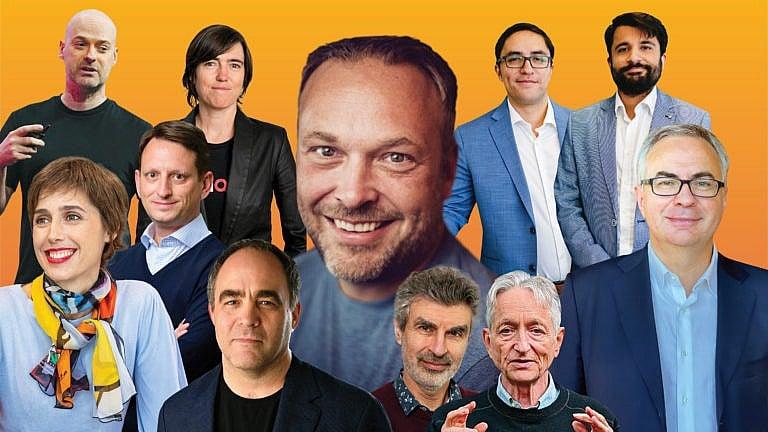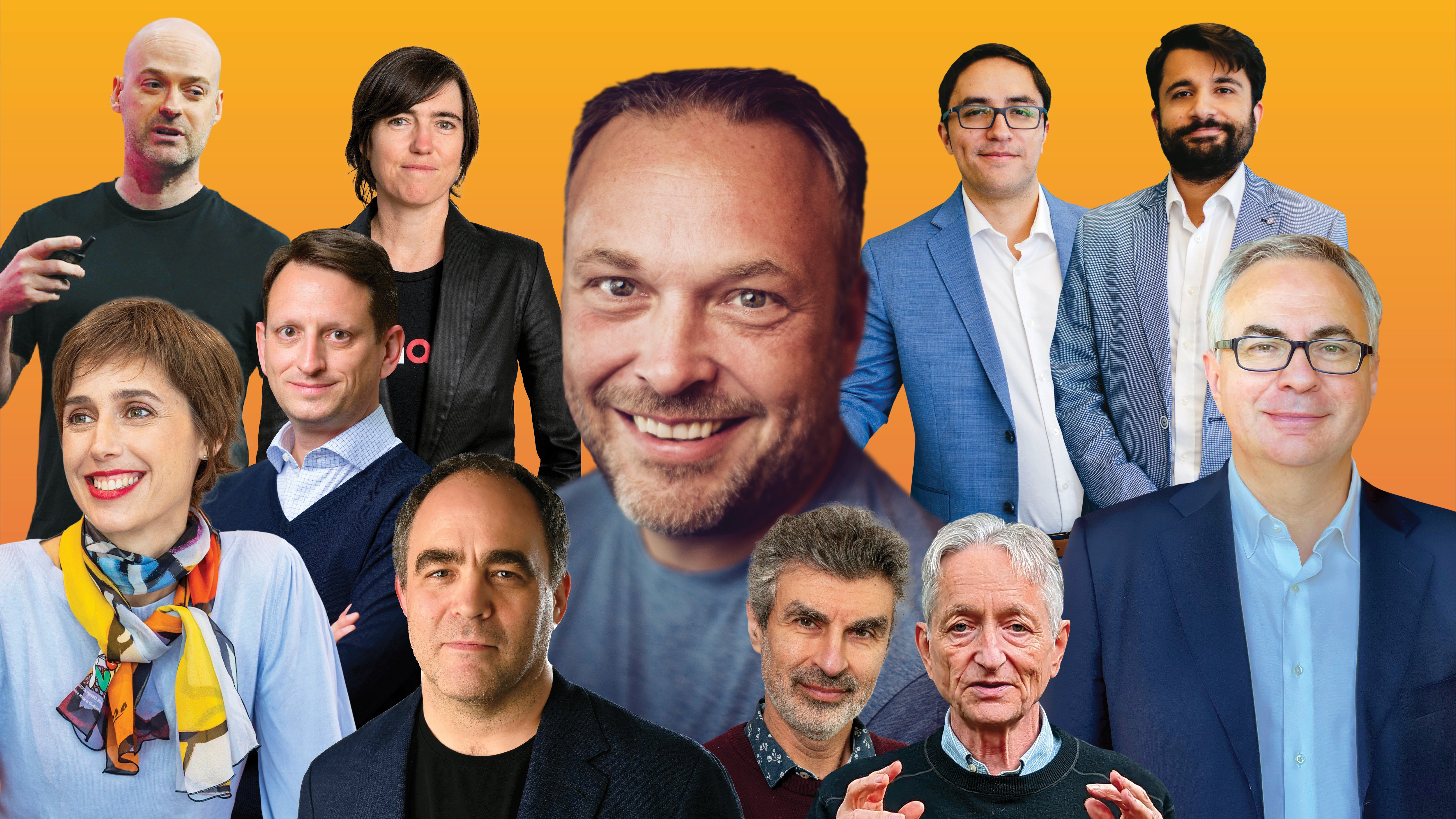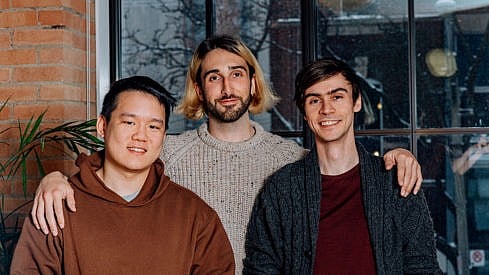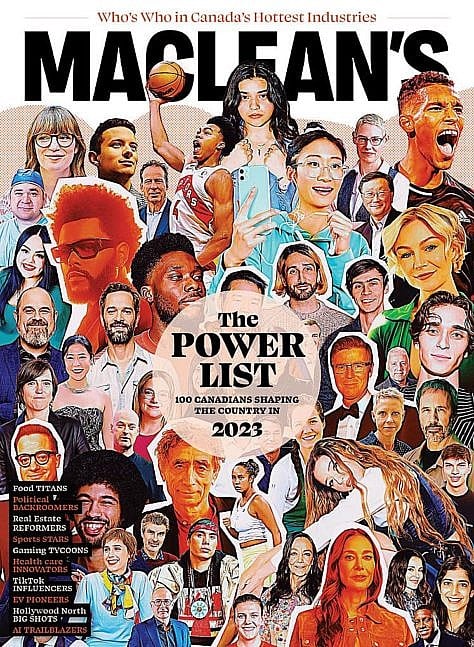The Power List: Top 10 AI Trailblazers
The innovators and iconoclasts placing Canada at the forefront of artificial intelligence

Share

These are innovators and iconoclasts placing Canada at the forefront of artificial intelligence. Check out the full 2023 Power List here.
MORE: See who made the 2023 Maclean’s Power List
1. Ivan Zhang, Aidan Gomez & Nick Frosst are creating a smarter, friendlier chatbot
Founders, Cohere

Click here to find out why Zhang, Gomez, and Frosst nabbed the top spot
2. Jamie King is making it tougher to pull off financial crimes
Fouder & CEO, Verafin
 Canada’s hottest billion-dollar company isn’t based in Toronto or Vancouver, but in St. John’s. When Jamie King co-founded Verafin with Raymond Pretty and Brendan Brothers in 2003, it was a small startup focused on detecting financial fraud and money laundering. Verafin made its name by expanding its security services to credit unions across Canada, eventually breaking into the United States. It analyzes large amounts of data, looking for changes or irregularities that could indicate financial crimes, such as fraudulent cheques or money laundering. In 2020, Verafin was acquired by Nasdaq for US$2.75 billion, though its head office remains in Newfoundland. These days, King is with Nasdaq full time: in 2022, he was promoted to the role of executive vice-president overseeing financial crime.
Canada’s hottest billion-dollar company isn’t based in Toronto or Vancouver, but in St. John’s. When Jamie King co-founded Verafin with Raymond Pretty and Brendan Brothers in 2003, it was a small startup focused on detecting financial fraud and money laundering. Verafin made its name by expanding its security services to credit unions across Canada, eventually breaking into the United States. It analyzes large amounts of data, looking for changes or irregularities that could indicate financial crimes, such as fraudulent cheques or money laundering. In 2020, Verafin was acquired by Nasdaq for US$2.75 billion, though its head office remains in Newfoundland. These days, King is with Nasdaq full time: in 2022, he was promoted to the role of executive vice-president overseeing financial crime.
3. Geoffrey Hinton & Yoshua Bengio are helping make Canada a global hub for AI research
Chief scientific adviser, Vector Institute; Scientific director, MILA
 The so-called godfathers of AI won the 2018 Turing Award for their research into neural networks, the brain-mimicking technology that fuels most current applications of artificial intelligence, including Apple’s Siri, Google’s search engine and most facial-recognition software. They’re also largely responsible for the burst of AI startups in Canada: Hinton is chief scientist at the Vector Institute in Toronto, where he’s fostered firms including natural-language processing firm Cohere and Deep Genomics, which uses AI to find treatments for genetic diseases. Bengio is Hinton’s counterpart at Montreal’s Mila, where he’s supported AI companies such as Korbit, which aims to develop AI-powered virtual teachers.
The so-called godfathers of AI won the 2018 Turing Award for their research into neural networks, the brain-mimicking technology that fuels most current applications of artificial intelligence, including Apple’s Siri, Google’s search engine and most facial-recognition software. They’re also largely responsible for the burst of AI startups in Canada: Hinton is chief scientist at the Vector Institute in Toronto, where he’s fostered firms including natural-language processing firm Cohere and Deep Genomics, which uses AI to find treatments for genetic diseases. Bengio is Hinton’s counterpart at Montreal’s Mila, where he’s supported AI companies such as Korbit, which aims to develop AI-powered virtual teachers.
RELATED: The AI superstars at Google, Facebook and Apple who studied under Geoffrey Hinton
4. Christian Weedbrook is bringing quantum computing to the masses
CEO, Xanadu
 Christian Weedbrook is developing a computer that may one day make your MacBook look as outdated as an abacus. The founder of Xanadu is working on a commercially viable quantum computer, which can harness the power of subatomic particles to perform otherwise impossibly complex, or impossibly time-consuming, computing feats. Major industry players, including Google and Microsoft, are in the same quantum-computing race, but Weedbrook is well-positioned. He’s earned a major vote of confidence from the federal government, which this year announced $40 million in funding for his company through the Strategic Innovation Fund. That boosted the company’s already hefty valuation to US$900 million—and brought our quantum future closer than ever.
Christian Weedbrook is developing a computer that may one day make your MacBook look as outdated as an abacus. The founder of Xanadu is working on a commercially viable quantum computer, which can harness the power of subatomic particles to perform otherwise impossibly complex, or impossibly time-consuming, computing feats. Major industry players, including Google and Microsoft, are in the same quantum-computing race, but Weedbrook is well-positioned. He’s earned a major vote of confidence from the federal government, which this year announced $40 million in funding for his company through the Strategic Innovation Fund. That boosted the company’s already hefty valuation to US$900 million—and brought our quantum future closer than ever.
#UofTEntWeek: #UofT-supported startup @XanaduAI is racing to build the world’s first photonic-based, fault-tolerant quantum computer – a machine that could have applications in everything from drug discovery to climate change mitigation. https://t.co/rfAb4tveJA pic.twitter.com/DFC8qu3526
— U of T News (@UofTNews) March 9, 2023
5. Raquel Urtasun is training real vehicles in a virtual world
CEO, Waabi
 Raquel Urtasun, a computer science professor at the University of Toronto, wants to take autonomous cars out of our fantasies and onto our streets. She parlayed her prior job experience as chief scientist and head of research at Uber’s self-driving division into founding Waabi in 2021. Its Waabi Driver software is trained on a closed-loop simulator that exposes the AI to an enormous number of hypothetical situations, which would take millions of hours to experience in the real world. So far, Waabi has installed its software on vehicles manufactured by partners. Last fall, it unveiled its first autonomous freight trucks, which will be deployed for testing and data collecting. Big players are taking notice. In January, Volvo’s venture capital arm announced it would sign on as a strategic investor.
Raquel Urtasun, a computer science professor at the University of Toronto, wants to take autonomous cars out of our fantasies and onto our streets. She parlayed her prior job experience as chief scientist and head of research at Uber’s self-driving division into founding Waabi in 2021. Its Waabi Driver software is trained on a closed-loop simulator that exposes the AI to an enormous number of hypothetical situations, which would take millions of hours to experience in the real world. So far, Waabi has installed its software on vehicles manufactured by partners. Last fall, it unveiled its first autonomous freight trucks, which will be deployed for testing and data collecting. Big players are taking notice. In January, Volvo’s venture capital arm announced it would sign on as a strategic investor.
Welcome to @Waabi_ai World, a driving school for self-driving vehicles, powered by #AI. https://t.co/2JRnAPxqhC #SAETomorrowToday #AV pic.twitter.com/eWdX22rxZF
— SAE International® (@SAEIntl) June 2, 2022
6. Geordie Rose is getting robots to do our dirty work
CEO, Sanctuary
 The words “artificial intelligence” often conjure up images of fictional androids, like Star Wars’ C-3PO and Star Trek’s Data. Geordie Rose is one of the few people on Earth who might be able to make sci-fi robots, or something like them, at least, into reality. Sanctuary, the company he co-founded in 2018, wants to understand the human mind well enough to build a machine that can take over dirty, dangerous jobs, including the most treacherous tasks in nuclear plants, mines or military operations. Then there are jobs that don’t exist yet, such as those that will be needed in space exploration. Rose’s project raised over $75 million early in 2022 and received $30 million more from the federal government’s Strategic Innovation Fund. He’s also getting help from bright lights in Canada’s science community, such as astronaut Chris Hadfield, who sits on Sanctuary’s advisory board.
The words “artificial intelligence” often conjure up images of fictional androids, like Star Wars’ C-3PO and Star Trek’s Data. Geordie Rose is one of the few people on Earth who might be able to make sci-fi robots, or something like them, at least, into reality. Sanctuary, the company he co-founded in 2018, wants to understand the human mind well enough to build a machine that can take over dirty, dangerous jobs, including the most treacherous tasks in nuclear plants, mines or military operations. Then there are jobs that don’t exist yet, such as those that will be needed in space exploration. Rose’s project raised over $75 million early in 2022 and received $30 million more from the federal government’s Strategic Innovation Fund. He’s also getting help from bright lights in Canada’s science community, such as astronaut Chris Hadfield, who sits on Sanctuary’s advisory board.
7. Pablo Molina & Faizan Sheikh are putting robots to work in a mall near you
CEO & CTO, Avidbots
 The co-founders of Avidbots originally wanted to build a machine that would shovel snow. Instead, Faizan Sheikh and Pablo Molina moved on to tackle a different annoying task: mopping the floor. Their autonomous industrial robot Neo 2 can map environments and learn to clean differently on different days, depending on schedules and workspaces.
The co-founders of Avidbots originally wanted to build a machine that would shovel snow. Instead, Faizan Sheikh and Pablo Molina moved on to tackle a different annoying task: mopping the floor. Their autonomous industrial robot Neo 2 can map environments and learn to clean differently on different days, depending on schedules and workspaces.
Facility managers need to know what was cleaned, when it was cleaned and how well it was cleaned. #Avidbots Command Center delivers in-depth reporting for your #Neo.
Learn more: https://t.co/iI1mzkGuCT#FacilityManagement #FacilitiesServices #HealthAndSafety #FloorScrubber pic.twitter.com/H1iNOyGFq6
— Avidbots (@Avidbots) March 14, 2023
Already, you can find more than 1,000 of their robots at work in airports, malls and factories around the world, helping to alleviate labour shortages and ensuring human workers can focus on serving customers, making products and other high-value tasks. If you haven’t seen one of their bots yet, you probably will soon: in the fall of 2022, Avidbots closed a US$70-million Series C funding round to expand its global reach.
8. Julien Billot is funding an AI-powered supply chain
CEO, Scale AI
 As we’ve recently learned, snarls in supply chains can have far-reaching effects. AI has the potential to head off those problems, optimizing how goods are manufactured, warehoused and shipped around the world. Julien Billot is CEO of Scale AI, Canada’s artificial-intelligence supercluster, a constellation of companies devoted to using the technology to make global supply chains more efficient and more resilient against disruptions. To date, Scale AI has invested more than $400 million from the government and private sector into efforts including intelligent forecasting to help pharmaceutical companies better prepare inventory; AI systems to improve route planning for shippers; virtual recreations of warehouses and factories to help managers get a better handle on operations, and the Galileo Project, a tool that predicts labour needs in ports.
As we’ve recently learned, snarls in supply chains can have far-reaching effects. AI has the potential to head off those problems, optimizing how goods are manufactured, warehoused and shipped around the world. Julien Billot is CEO of Scale AI, Canada’s artificial-intelligence supercluster, a constellation of companies devoted to using the technology to make global supply chains more efficient and more resilient against disruptions. To date, Scale AI has invested more than $400 million from the government and private sector into efforts including intelligent forecasting to help pharmaceutical companies better prepare inventory; AI systems to improve route planning for shippers; virtual recreations of warehouses and factories to help managers get a better handle on operations, and the Galileo Project, a tool that predicts labour needs in ports.
9. Joelle Pineau is preparing AI for the messy ambiguity of real life
Vice President, AI Research, Meta
 Meta, Facebook’s parent company, is betting big on artificial intelligence to build its metaverse, in which users will interact with one another in a parallel online reality. (It’s also betting big on AI boosting its ad revenue.) And you can find Joelle Pineau, one of Meta’s top researchers, in Montreal. The McGill professor is the co-managing director at Meta AI Research. Her studies involve improving how artificial intelligence responds to uncertainty—in other words, can it deal with situations that don’t have clear yes-or-no answers, or when it doesn’t know all the variables? The better the artificial intelligence performs in those scenarios, the better it can function in real life. It’s crucial research that will underpin much of Meta’s development, and Pineau is at the forefront.
Meta, Facebook’s parent company, is betting big on artificial intelligence to build its metaverse, in which users will interact with one another in a parallel online reality. (It’s also betting big on AI boosting its ad revenue.) And you can find Joelle Pineau, one of Meta’s top researchers, in Montreal. The McGill professor is the co-managing director at Meta AI Research. Her studies involve improving how artificial intelligence responds to uncertainty—in other words, can it deal with situations that don’t have clear yes-or-no answers, or when it doesn’t know all the variables? The better the artificial intelligence performs in those scenarios, the better it can function in real life. It’s crucial research that will underpin much of Meta’s development, and Pineau is at the forefront.
10. Jordan Jacobs is funding AI projects of the future
Co-founder, Radical Ventures
 Jacobs has his fingerprints on some of Canada’s biggest AI projects. He co-founded Layer 6, a machine-learning platform for the finance industry (it was later acquired by TD) and was a founding member of the Vector Institute in Toronto—basically the Emerald City of Canadian AI research. His ambitious VC fund, Radical Ventures, is now funding the ecosystem he helped create: their portfolio includes some of the most promising startups in Canada, like chatbot creator Cohere, autonomous vehicle company Waabi and quantum computing firm Xanadu. “AI will eat all software over the next decade,” Jacobs recently predicted in an interview, and he’s making sure Radical is prepared for that future: the company is currently raising a new fund worth US$550 million.
Jacobs has his fingerprints on some of Canada’s biggest AI projects. He co-founded Layer 6, a machine-learning platform for the finance industry (it was later acquired by TD) and was a founding member of the Vector Institute in Toronto—basically the Emerald City of Canadian AI research. His ambitious VC fund, Radical Ventures, is now funding the ecosystem he helped create: their portfolio includes some of the most promising startups in Canada, like chatbot creator Cohere, autonomous vehicle company Waabi and quantum computing firm Xanadu. “AI will eat all software over the next decade,” Jacobs recently predicted in an interview, and he’s making sure Radical is prepared for that future: the company is currently raising a new fund worth US$550 million.
Check out the full 2023 Power List here
This article appears in print in the March 2023 issue of Maclean’s magazine. Buy the issue for $9.99 or better yet, subscribe to the monthly print magazine for just $39.99.
